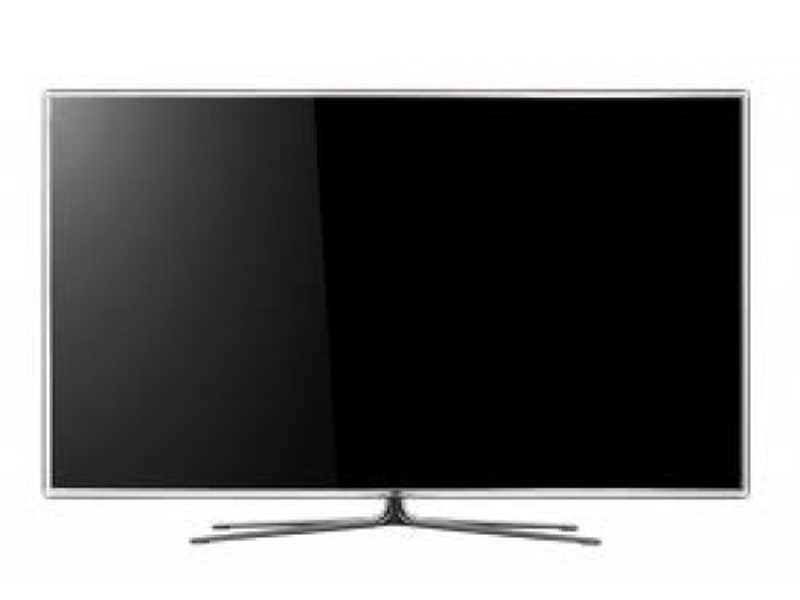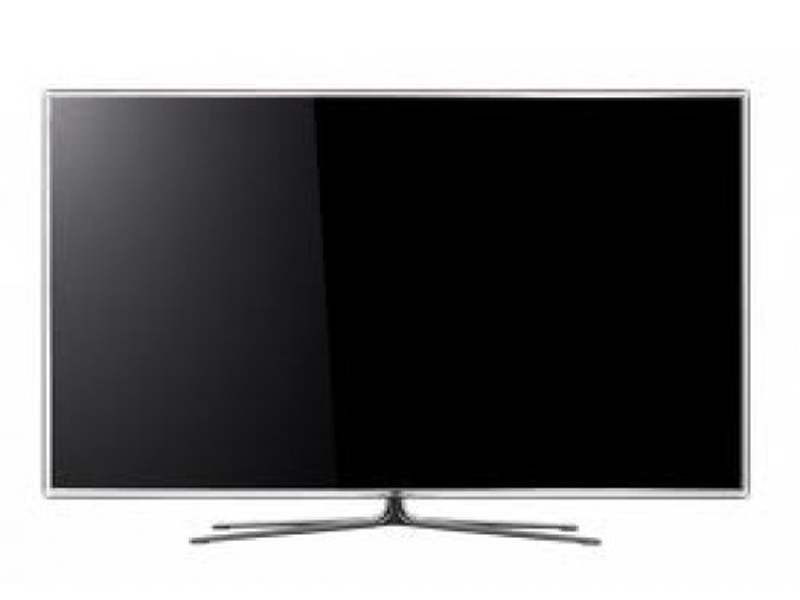Why you can trust TechRadar

Samsung has pulled out every last stop with the UE46D7000. The stunning, all-but-invisible screen surround has a potential benefit when watching 3D as having a defined border around a three-dimensional picture can subtly reduce its impact.
The UE46D7000 sticks out a bit more round the back than last year's C series, but unless you happen to live in some over-designed pad where your TV might, for whatever reason, be plonked in the middle of your room, it surely makes more sense to have a trim bezel that you can see rather than a trim rear that you can't.
The set's slightly deeper rear also has the advantage of enabling you to attach more cables without needing adaptors than was possible with last year's über-slim Samsung models. It's quite a set of connections, too. Four HDMIs and three USBs lead the way, with good support coming from a LAN jack and, best of all, built-in Wi-Fi. There's no need here for one of those silly USB dongles so common among last year's online TVs.
The only connections you'll still need to use (provided) adaptors for are the Scart and component options.
The UE46D7000's feature count is truly prodigious. Its contrast ratio is apparently so vast as to defy meaningful measurement, while motion is rated at '800CMR' based around Samsung's self-styled Clear Motion Rate. This means that the TV should be able to remove pretty much all traces of judder and blur, even when viewing 3D, via the set's highly flexible motion processing tools.
As usual with such tweaks, you have to handle them with care. But the key point is that Samsung has made such care possible by not only including a varied suite of motion processing presets (including our preferred Clear mode) but also enabling you to fine-tune the weight of the processing elements as applied separately to judder and blur.
There's also an interesting Motion Lighting feature that's new to Samsung this year, where the TV adjusts the brightness of its pictures in response to their motion content. Anyone who puts picture quality above environmental concerns will probably want to avoid this, along with numerous other green features, including a system for automatically adjusting the picture to suit ambient light conditions. If you're a planet-first kind of person, however, the UE46D7000 has plenty of tricks to keep your conscience clear.
The backlight's LEDs, for example, are down the sides, rather than along the top and bottom, of the screen, cutting the number of diodes, and therefore reducing the amount of power required to illuminate the display.
People serious about calibrating their TVs should feel reasonably content with the amount of adjustments on offer. Highlights include a decently flexible colour management system, a 10-point white balance adjustment, both digital and MPEG noise filters, shadow detail and gamma adjustment and the options to turn off or adjust the strength of both black tone and dynamic contrast processors.
The latter of these is probably best turned off, or at least not set higher than Low, as it can cause the picture's overall brightness level to jump too obviously for comfort. In fact, setting the TV up to its best advantage is rather hampered by the fact that a number of the tools Samsung provides can make pictures look worse rather than better. The edge enhancement tool, for instance, makes pictures look gritty and forced and Motion Plus can generate processing artefacts if set too high.
From this it's debatable if some of the UE46D7000's features are really worth including, but Samsung would doubtless argue – with some justification – that it's just trying to cater for all the potential tastes out there.
There's another important menu in this TV. Smart Hub is accessed via a dedicated button on the remote and is a brand new 'jumping off' screen to what turns out to be pretty much every possible source for the TV, including the normal (Freeview and Freesat HD) tuners; video, photo and music content stored on USB sticks; the numerous apps now available via Samsung's new app store; open internet access via a built-in browser and Samsung's new dedicated 'video browser'.
This latter feature includes an Internet Movie Database-style service that enables you to look up facts on favourite films, recommend films to friends, and even search either Samsung's 'local' online services or the internet at large for downloadable versions of films you want to watch.
The 'Universal search' tool on the main Smart Hub page is genuinely revolutionary, tying you to the wider world in a way no previous TV has managed.
As for the apps support, at the time of writing there were 37 for you to choose from, all of them free. But doubtless more, including some you have to pay for, will appear soon, especially as Samsung's code for designing apps has now been made available to anyone who wants a go (though bear in mind that you still have to run the fruits of your app-design labours through Samsung's quality control department before it will be allowed to go 'live').
Among the most useful apps available at the time of writing were LoveFilm, AceTrax, YouTube, Twitter, Facebook, Skype and Picasa and the BBC iPlayer is scheduled to be up and running by the time the TV hits the stores.
As anyone familiar with Smart Phones will realise, by no means all of the apps available from Samsung's app store will be worth troubling yourself with. The games currently on offer, in particular, are very half-baked, but of course, it only takes a handful of gems to make the whole 'Smart' apps approach to content seem like the coolest thing since sliced bread.
All in all, the almost ruthless efficiency of the Smart Hub screen together with the extent of the 'Smart' services on offer combine to make the UE46D7000 feel more revolutionary then merely evolutionary.
Turning finally to the UE46D7000's 3D features, Samsung has provided quite a striking selection of tools for you to play with. For instance, you can choose to convert 2D content into 3D, choose between manual and auto settings for the '3D Effect', choose to have the TV automatically switch to 3D playback if it detects a 3D input (including Sky's side by side system) and use a 3D Optimisation tool for subtly shifting the image's depth and sharpness.
Current page: Samsung UE46D7000: Features
Prev Page Samsung UE46D7000: Overview Next Page Samsung UE46D7000: Picture qualityJohn has been writing about home entertainment technology for more than two decades - an especially impressive feat considering he still claims to only be 35 years old (yeah, right). In that time he’s reviewed hundreds if not thousands of TVs, projectors and speakers, and spent frankly far too long sitting by himself in a dark room.

